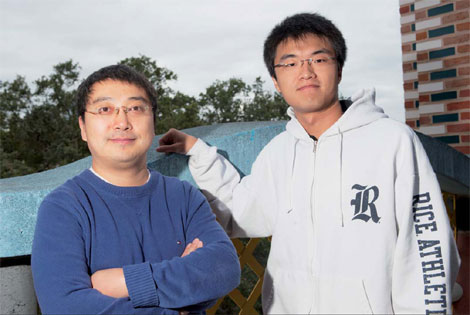Fingers on the pulse
Updated: 2011-11-18 07:45
By David Lariviere (China Daily)
|
|||||||||
|
Zhong Lin (left) and Zhao Siqi have developed a program that can analyze tweeting patterns during major events, such as football games. David Lariviere / For China Daily |
Engineers develop Twitter monitoring program that can predict real-time US election result
Zhong Lin believes Twitter, with its 200 million active users, can be a powerful tool in gauging what people are talking about.
The Sichuan native, along with co-creator Zhao Siqi, is trying to develop unique applications for putting the explosion in social media to uses that could eventually change the world in a positive way.
Zhong, a graduate of Tsinghua University, and Zhao, from Hong Kong University, are engineers at Rice University who designed a computer program called SportSense that analyzes tweets in real time.
"People don't often think of themselves as being sensors, but each of us constantly senses and reacts to our environment," says Zhong, associate professor of electrical and computer engineering and computer science at Rice.
"Thanks to social media sites like Twitter, it is now possible to capture those reactions - for millions of people - in real time."
For now, Zhong and Zhao are focusing on monitoring fans' in-game reactions to National Football League (NFL) contests, which amount to an average of 15 tweets per second.
"We chose football because touchdowns, interceptions and other events in the game cause a lot of excitement and lead a lot of people to tweet," Zhong says.
"We found that a careful examination of the tweets could tell us what was happening in the game. The program can usually tell within 20 seconds when a big play like a touchdown occurs."
When users click to "watch" a particular game, SportSense displays three graphs: one that shows the big plays and the overall excitement level of everyone watching the game, and two others that highlight the excitement level of fans cheering for each team. The name for the program came from a poll Zhong conducted in his classroom.
There are 500,000 NFL tweeters each week and rising. Zhao says the total was more than a million for each of the last two Super Bowls. "The NFL is a good benchmark because there are a lot of watchers and a lot of major events," Zhong says.
"In contrast, in basketball they score very often and it's hard to determine the meaningful scoring."
Zhong hopes the technology will be more reliable than the Nielsen ratings, used by networks for decades to determine advertising rates, but more studies are needed first.
"With the Nielsens, they pay people to put an instrument in their home but there are a few thousand people and I don't know how engaged or how excited the family is," Zhong says.
A much larger sample size would come from monitoring tweeters but the demographics would be vastly different.
"Tweeters are usually younger, hipper, more tech-savvy. That's the down side - they are not representative of the US population," says Zhong, who came to the US in 2000.
Zhong, 36, and Zhao, 25, began developing SportSense in late 2009 in collaboration with engineers at Betaworks, the research and development unit of Motorola Mobility, and five of their Chinese students.
Zhao, originally from Beijing, arrived in the US in 2009 after studying science and technology at Hong Kong University. He's now pursuing his doctorate at Rice.
Currently, Zhong and Zhao have "no plans to commercialize" SportSense but acknowledge its "huge market potential". They plan to experiment with the product for the next two to three years and then apply for a patent right before a potential start-up.
Venu Vasudevan, senior director at Motorola Mobility, "We certainly see (a start-up) as likely because the relationship between Twitter and TV has become more exciting. We could definitely see something coming from that space."
Zhong says the research team is interested in using the software to sense other topics. "Anything with a sufficiently large audience has a similar potential," he says. "Things that are televised, like reality shows and political debates, are certainly possibilities."
The team is optimistic the technology can make a grand projection in 2012.
"We're hoping to use Twitter to predict who will win the (US) presidential election," Zhong says.
A political scientist has been added to the team. "We want to have Twitter be a data source so governments can collect information about its citizens," Zhong explains.
That includes his homeland of China. "The government could be more effective if they could find out what people are talking about. I'm not talking about censoring - I mean on subjects like the price of food, for example how the price of pork has increased, and traffic jams," Zhong says.
Weibo, or microblogs, is the Chinese version of Twitter.
Motorola Mobility is not that concerned with the macro political topics at this point. "Lin has a larger interest but our interest is narrower," Vasudevan says. "We want to know about the TV watcher and what they care about."
"We're also interested in sensing things on a local scale," Zhong adds. "For example, when a storm hits and the power goes out in my neighborhood, I would like to know when it comes back on - even if I happen to be at work. People tweet about those types of events, so the signal is there in the data; it's just a matter of finding it."
The "talking", Zhong says, might help governments "be better prepared" for future storms.












